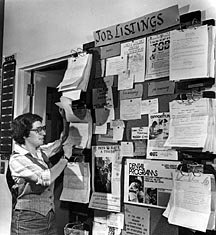|
Jobs & Placement
|
Programs: Jobs & PlacementResearch by Janice Dilg
|
 |
|
|
Domestic service was the major employment sector for women and girls at the turn of the century and virtually the only job category open to women of color in U.S. cities. In 1903, the YWCA took over the "Portland School of Domestic Science" and in 1905, cleverly linked its cooking classes to a cafeteria and tea room in the Wortman, Olds & Kings department store, thereby running a doubly profitable venture. Also And successful venture of the YWCA in the years before World War I was their Commercial Department which offered "Business Classes" in stenography, type-writing, and basic office and secretarial work. Training certificates and recommendations from the YWCA allowed women to leverage their position in the job market. The organization also ran its own employment bureau that screened employers and employees and tried to broker better job conditions.
In general, the Portland YWCA remained more shy of labor organizing than other urban YWs before World War II and took no particular stance on protective legislation regulating hours and wages for women workers. Backed by men's labor unions, Oregon passed its landmark protective legislation in 1903, which was upheld by the Supreme Court decision Muller v. Oregon (1908). Despite the controversy over the law and its exclusion of non-white women, the Portland YWCA felt little pressure to advocate one way or the other over this issue. On the eve of the Great Depression, Portland reported to the National YWCA that regarding legislation over women in industry: "Nothing has been done. Oregon itself has very good laws..."[1]
 |
 |
|
|
|
Of all the challenges posed by social activism in the 1960s and 70s, the Portland YWCA probably met most easily the interest in new careers for women. This response derived in part from the historic commitment of the YWCA to improving women's job access and skills. It also stemmed from the changing class composition of the YWCA's board of directors. Before World War II, leisured women dominated board leadership but by the 1960s, employed and professional women more frequently took on board responsibilities in the Portland YWCA. Career counseling, support for non-traditional jobs for women, attention to work environments that accommodated women's roles as caregivers, and an accent on financial independence for women all figured in Portland YWCA job and employment programs during the 1970s.
![]()
1. Statistical Report to the National YWCA, 1929, Portland YWCA Archives, Portland, Oregon.
Back to Text
![]()
|
YWCA
Today | African-American Women
| Asian American Women |
| World War II | Religion,
Race, & Reform | Buildings
| Camping |
![]()






